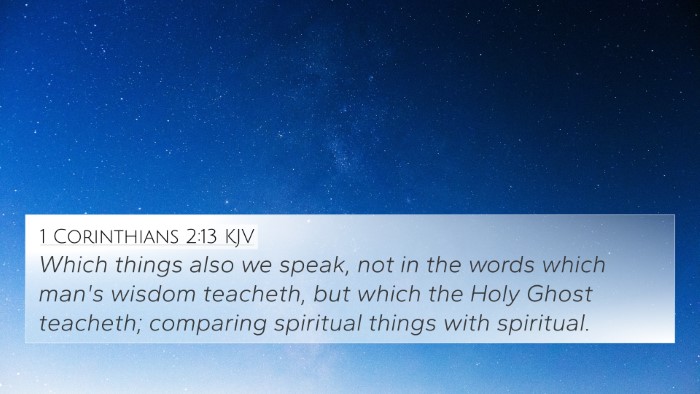Understanding 2 Corinthians 1:12
2 Corinthians 1:12: "For our boasting is this, the testimony of our conscience, that we conducted ourselves in the world in simplicity and godly sincerity, not with fleshly wisdom but by the grace of God, and more abundantly toward you." This verse gives insight into the Apostle Paul's integrity and the manner in which he and his companions conducted their ministry.
Summary of Meaning
In this verse, Paul articulates the basis of his confidence in his ministry. He emphasizes his adherence to a life of sincerity and simplicity, which reflects commitment to the principles of Christ. The use of the term “boasting” is not in the sense of arrogance but rather a humble acknowledgment of the moral and spiritual integrity that he maintained.
Key Themes
- Sincerity in Ministry: Paul's emphasis on sincerity indicates a desire for transparency and authenticity in service to God and others.
- Dependent on Divine Grace: He acknowledges that his ability to act with integrity was by the grace of God, highlighting his reliance on divine support rather than human wisdom.
- Resistance to Worldly Wisdom: Paul distinguishes between fleshly wisdom and the wisdom imparted by the Holy Spirit, underscoring the theme of spiritual discernment in ministry.
Bible Verse Cross-References
When studying 2 Corinthians 1:12, several other verses provide illuminating connections:
- Romans 12:2: Encouragement to not conform to the world’s standards but be transformed through the renewal of the mind.
- Philippians 3:3: Paul discusses the true circumcision being those who worship God in the Spirit and have no confidence in the flesh.
- 2 Corinthians 4:2: Paul notes that he has renounced secret and shameful ways, affirming his transparent and upright conduct.
- 1 Timothy 3:9: Leaders in the church must hold the mystery of the faith with a clear conscience.
- James 3:17: The wisdom that comes from heaven is pure, peace-loving, considerate, submissive, full of mercy and good fruit, impartial and sincere.
- Colossians 3:23: Encouragement to do everything heartily as unto the Lord, reaffirming the principle of sincere motivation.
- 1 Peter 3:16: The call to maintain a good conscience so that those who speak maliciously against one's good behavior in Christ may be ashamed of their slander.
Insights from Commentaries
Various biblical scholars and commentators provide valuable insights into this verse:
Matthew Henry
Henry emphasizes that Paul's confidence is rooted not in worldly accolades but in the peace of conscience he experienced due to his faithful and genuine conduct. This statement serves as a call to all believers to prioritize integrity and sincerity in their lives.
Albert Barnes
Barnes highlights the idea that Paul’s statement about conducting himself in simplicity and sincerity points to a life lived above reproach. He stresses that true Christian character is revealed through actions that reflect God's grace rather than human wisdom.
Adam Clarke
Clarke elaborates on the term “simplicity”, suggesting that it implies a lack of duplicity and a straightforward approach to life and ministry. He notes that Paul’s ethos serves as a model for believers who aim to live authentically within the faith community.
Thematic Bible Verse Connections
Connecting 2 Corinthians 1:12 with other scriptural references helps enhance understanding:
Spiritual Integrity
- Proverbs 10:9: "Whoever walks in integrity walks securely." This reflects the stability that comes from living a transparent life.
- Galatians 5:22-23: The fruits of the Spirit emphasize qualities that resonate with Paul's conduct of sincerity and grace.
Grace of God in Conduct
- Ephesians 2:8-9: Highlights that grace is the foundation of salvation and should also be the influence in our actions and relationships.
- 1 Corinthians 15:10: Paul credits the grace of God for enabling his labor and faithfulness, reinforcing a key theme in his teachings.
Conclusion
Philippians 1:27 could summarize Paul’s admonition in 2 Corinthians 1:12 perfectly: "Conduct yourselves in a manner worthy of the gospel of Christ." As believers reflect on this verse, they are reminded of the importance of sincerity, grace, and integrity in their daily living as a testimony to their faith.
By utilizing tools for Bible cross-referencing, such as concordances and reference guides, readers can deepen their understanding of how these themes connect throughout the Scriptures. The insights gained from studying parallel verses and their interconnections can enrich one’s spiritual growth and foster a better understanding of the holistic message of the Bible.


























